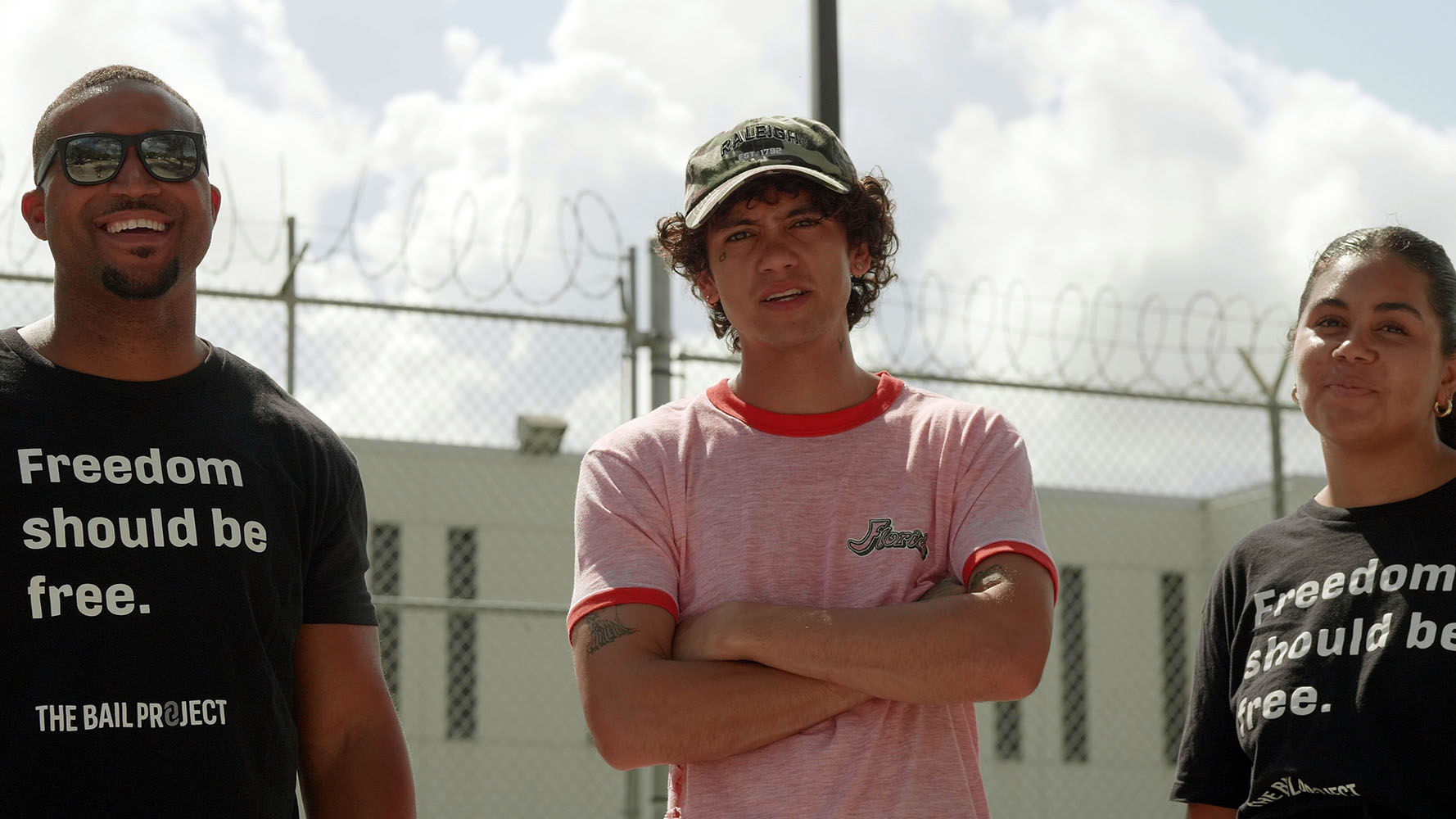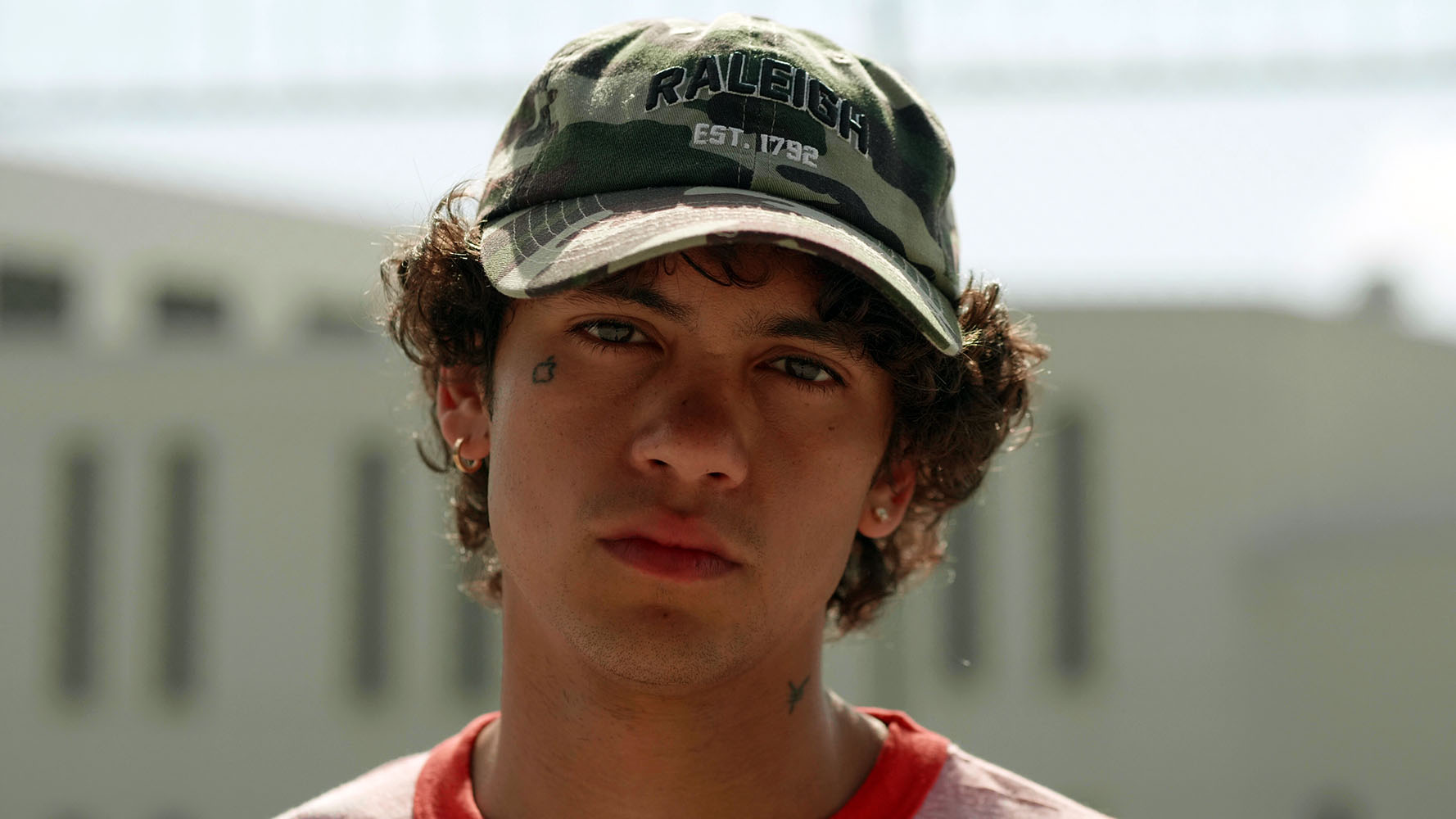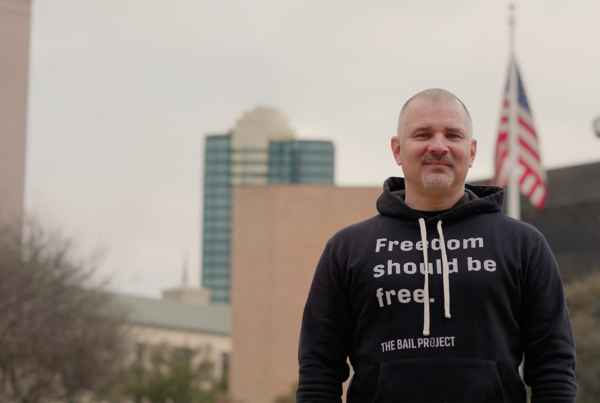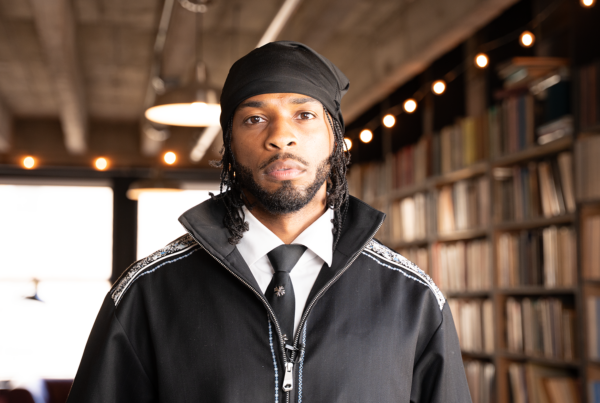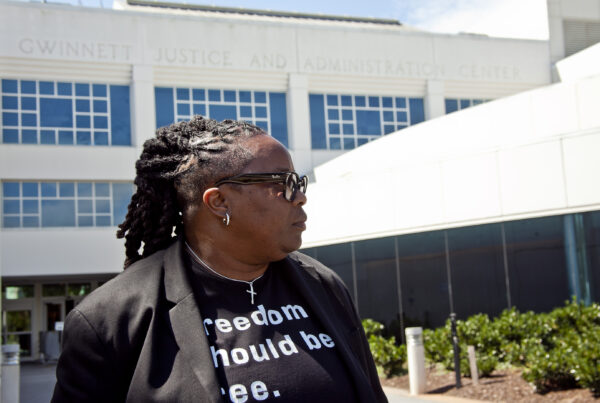Video Transcript
DOMINIC: Hi my name is Dominic Fike and I’m here with The Bail Project. And we are standing in front of the Collier County Jail, which I was previously incarcerated in. And today we’re going to bail some people out of jail.
HANNAH: Yeah, it’s so nice to meet you! You know we made a special trip down here to help you bail people out of the Collier County Jail in Naples. Like how does that feel? Like just being back here?
DOMINIC: It’s weird. It’s a lot less anxiety than you would think. I remember the day I was released from here, as soon as I walked out I didn’t feel anything. It’s weird how it does that. But man, I mean I’m excited to be here with you guys and meet you guys. I think what you’re doing is incredible. I’d like to learn a little bit more about it.
HANNAH: Yeah, yeah awesome. Well we’re a national nonprofit and we pay people’s bail for free. So you know we help people that are in jail just waiting for a court date. They haven’t been convicted of anything, they’re just waiting to have their day in court. And we set up a release plan for them after we pay their bail so they have everything they need to get back to court. You know text reminders, free rides to court, just so that they can fight their case from a position of freedom like anybody with money would do.
DOMINIC: That’s incredible. You would think that would be the job of like the people who kind of lock you up.
HANNAH: Right, right you would think. Yeah, I mean you know bail was originally intended as an incentive to return to court but now it’s really just used to keep people without money behind bars. I mean our work shows that you don’t need money to return to court. Our clients return to over 90% of their court dates with no money on the line. So we’re just trying to prove that point and use the work that we’ve been doing the past five years to make some change.
DOMINIC: Incredible.
HANNAH: Yeah but, how was your experience being in jail?
DOMINIC: It’s overwhelming how many people are in jail. It’s like when I got there I was sort of like just taken back by how big of a system it was how many people how many families are dealing with their you know loved ones being in this cage and kind of the conditions and how used to it like the cops are. The you know the people holding you there are just sort of like you know stick and move keep going keep going one after another. It’s like being on a product line sort of. Felt like a piece of meat.
I mean the whole process of being kind of roped into the system constantly needing rides to get from this you know building to go register here before you’re arrested there. And then you know I think that was the most tiring part was kind of learning all the ins and outs of the system.
HANNAH: Yeah, the system is so confusing and alienating and many people don’t even know what their options are. And instead of trying to help you through that process, bail bondsmen come in and they’re just worried about making a profit. You know we operate a national revolving bail fund that’s completely funded through donations. We pay 100% of the bail directly to the court so that when someone’s case closes we get 100% of that money back and use it to help the next person.
DOMINIC: Well, hats off to you guys. I’m going to keep it on because it’s hot.
HANNAH: Please! I get it, I get it.
DOMINIC: But hats off.
Actually I don’t know that I was bailed out. I think my parents were also in jail and I didn’t have friends with money at the time. Again it was like a learning like I really had and everyone is so well versed in it. They’re kind of moving too fast for you to like ask them what these things mean and if you do you’re kind of looked at as like an idiot. I’d heard the terms like plea deal and things like on TV.
HANNAH: Right.
DOMINIC: You know what I mean? And when you’re in court and they’re asking you these serious fucking questions you’re like oh my God.
HANNAH: Like wait, do I really know what that is?
DOMINIC: Yeah, wait wait wait wait.
HANNAH: Actually what are my options?
DOMINIC: Seriously that’s kind of how it was like for me and my experience. It was sort of like I was just constantly trying to grab a hold of you know the situation. Because of kind of my lack of knowledge I think that’s what contributed to my you know incarceration. After going to so many court dates and jumping through so many hoops. And I was in there for a little bit, you know. A little under a year probably. So I kind of had people on the outside, you know waiting. And I had a girlfriend. Can’t beat that, you know what I mean. She would send me money and nice messages.
HANNAH: Yeah, I mean that’s something people don’t think about, you know if you don’t have any support.
DOMINIC: A lot of people don’t in there.
HANNAH: Right!
DOMINIC: A lot of people don’t have anything. I saw a lot of people that were going through it.
HANNAH: No you’re right, I mean it affects so many people. Like on any given night nearly half a million people are sleeping in jail cells, a lot of them just because they can’t afford their bail. Instead of waiting for their day in court, a lot of them are forced into taking plea deals just to go home.
DOMINIC: For real, I actually did that. I didn’t want to like fight at all. So we were just like yeah whatever you’ll give me as long as it’s not five years whatever you’ll give me that will make this done, you know what I mean. That’s the crazy part is they sort of scare you into incarceration half the time. Because they’ll be like well if you don’t you know take this plea then there’s a chance that you’ll lose and you’ll end up here longer, and also there’s just going to be a continuation of these court dates and the stress that that’s going to bring and that stress is going to add on to whatever stress is already kind of present in your life which is typic… I don’t know. Down here it’s just like, ugh God.
It felt like a joke kind of growing up here. Almost like a big fucking play. I was just kind of surprised at how it all was so well oiled and functional with this huge underlying problem. And I had become more and more aware of it each year and each time we would have to move or something would affect the family financially you’d become a little bit more aware of the divide and how serious it is. What I’ve been here for a week, there’s like three people of color maybe that I’ve seen. Isn’t that nuts?
HANNAH: Yeah, it really is.
DOMINIC: Just because I was hanging out in the in the nicer places or like Fifth Avenue, Third Avenue. Like these are just like expensive white owned like clean they’re just constantly being patrolled. And if you don’t kind of fit the description of the average shopper you’re pulled over, your license may be expired your tags are or a headlight out or something like that, you’re gonna go to, I mean God forbid you have marijuana in the car you’re going straight to jail. And then you’re tied into this system, and then it’s you know difficult to get back to court and then all of a sudden you’re taking a plea deal and then you have this thing on your record and it’s difficult to get a job because you don’t have a job well then you’re back in here. And it’s just nuts, man.
HANNAH: Yeah, I mean thinking about your experience how have you used it to help get others to care about the same issues that you care about?
DOMINIC: I mean it’s affected me positively in ways obviously. Like I can use in music and talk about it and relate to others and maybe lift others out of the sort of despair that comes with you know just being attached to the system. But I don’t know it’s kind of bittersweet. I think I try to bring a little bit of awareness to friends and family and maybe people on the internet about how terrible this can be. I try not to make it out to be a sob story. I’m just like it’s really hard and there are real people in there and these people have families and connections to us and I don’t know you’d never know unless somebody told you, because it’s not like it’s documented you know.
HANNAH: I mean that’s why we focus on bail. It’s really a hidden part of systemic violence and an entry point to mass incarceration. We’re using our data to prove that cash bail is unnecessary and unjust.
DOMINIC: If you can get a handle on it early and kind of get a little understanding of it and maybe some help you know that can prevent years and years or a lifetime of just looping in this fucking system. I have a better understanding of what you guys do. I admire it. I’m infinitely you know at your service. And it’s incredible. Let’s keep the day, let’s keep it going.
HANNAH: Yeah, yeah.
DOMINIC: Let’s go get Courtney out of jail because this place sucks.
For anyone that is a fan of me or has ever I don’t know listened to any of my songs or watched me on TV, I would encourage you to research The Bail Project and just educate yourselves about what it is that they do and who they help and how they’re helping because to me it’s very important. And I think that everyone could do with a little bit more you know knowledge on the subject. So, love.
We’re guessing by now you’re a fan of Dominic Fike.
It’s possible right now you’re even streaming his chart-topping debut album What Could Possibly Go Wrong or in the middle of binge-watching Dominic as Elliot in season 2 of HBO’s Euphoria. At The Bail Project, we know Dominic not only as a multitalented musician and actor, but also as a passionate advocate for pretrial reform and social justice.
To anyone who’s been paying attention to his career, this will come as no surprise. He wrote and released his breakout hit “3 Nights” while incarcerated and has since used his growing celebrity to shine light on systemic issues and be a voice of resistance. None of this is more relevant than on his just-released second studio album Sunburn with his new single “Dancing in the Courthouse.”
His newest video isn’t a music video. It’s a bailout video!
The Bail Project recently teamed up with Dominic and traveled to his hometown of Naples, Florida to bail people out of the Collier County Jail – the jail he was once incarcerated in himself.
In the video, The Bail Project’s Hannah Webster sits down with Dominic to hear more about his personal experience and talk about our mission to remove money from pretrial justice, protect the presumption of innocence, and create a system that works for all people no matter their race or wealth. Watch to hear Dominic talk about his firsthand experience in jail, the challenges he faced growing up in Naples, and how he uses his music to relate to others who are impacted by the system.
Florida’s cash bail crisis is reflected in its wealth and racial divides.
When the opportunity to make a special trip to Naples with Dominic came up, we jumped at the chance. Naples is home to the second richest zip code in the country and has the widest income gap in the state – the top 20% of households have an average income of over $350,000, while the bottom 20% have an average income of under $18,000. Black people represent 20% of those living below the poverty line in Naples and 21% of Collier County’s total incarcerated population, despite making up only around 8% of the county’s general population.
Each year, at least 350,000 different people are booked into local jails in Florida. When it comes to cash bail, Florida is unique because of the high fines and fees placed on residents – like the $50 fee required by state law to apply for a public defender. These fines and fees, unlike in most other states, are automatically taken out of bail refunds. The Bail Project’s national revolving bail fund model normally operates by paying bail directly to the court and receiving 100% of that money back when a client’s case closes. In Florida, we only receive about 60% of bail money back. In some cases we don’t receive any refund at all because of the amount of the fines and fees owed – but we remain committed to helping Floridians in need.
The Bail Project operates in over two dozen jurisdictions across the nation, including in three Florida counties that cover the cities of Jacksonville, Orlando, and Pensacola. We’re using the data and stories we collect to make policy changes statewide and create a more just, equitable, and humane justice system for all Floridians.
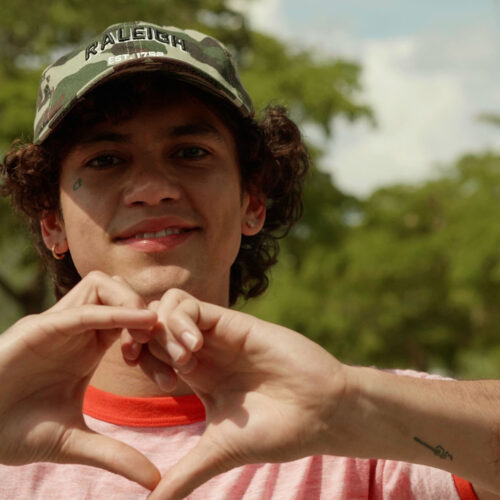
”For anyone that is a fan of me or has ever listened to any of my songs or watched me on TV, I would encourage you to research The Bail Project and just educate yourselves about what it is that they do and who they help and how they're helping because to me it's very important.
Dominic Fike
Join Dominic and The Bail Project and TAKE ACTION!
If you’re looking to get more involved, you can support The Bail Project’s mission by donating directly to bail someone out of jail or following us on social media and sharing Dominic’s video to help educate your networks about what cash bail is and why it is a problem.
The fight for a more equal pretrial system takes all of us, and we’re grateful to have Dominic’s support and his music as a soundtrack. We’ll continue bailouts in Florida and nationwide until freedom is truly free for everyone.
Thank you for engaging with our content. People like you make a better world possible – a world where justice is not determined by someone’s wealth. The Bail Project is not only an immediate lifeline for people held on unaffordable cash bail, but a growing megaphone for public education and social change. If you have the means and found value in our content, please consider becoming a donor today.







